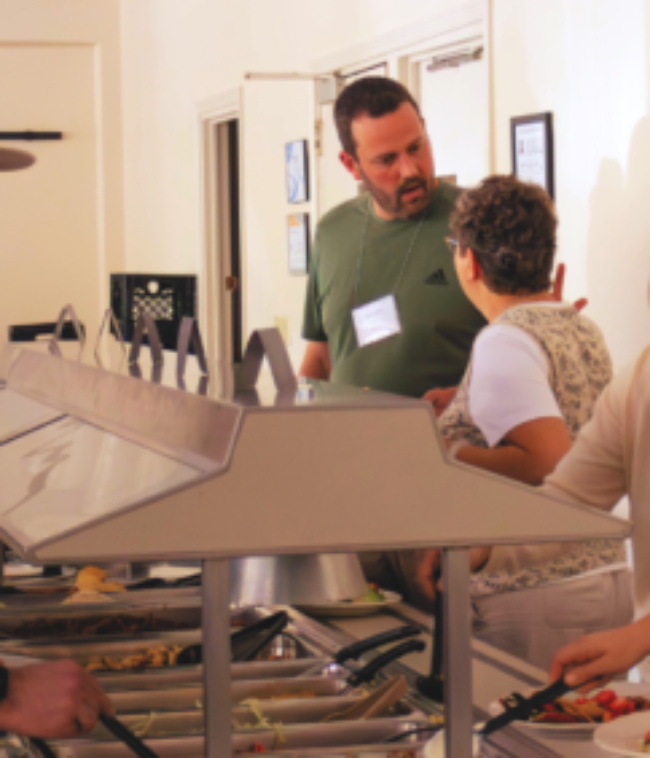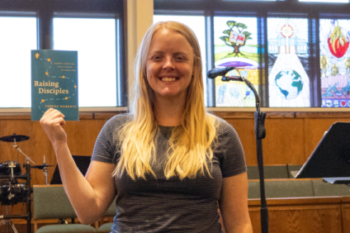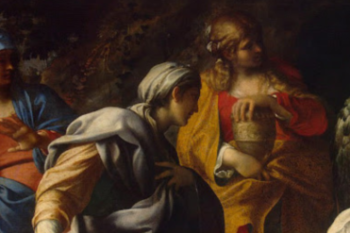The One With Joe Cocker, Mean Girls, and Eugene Peterson: A Review of Lunchroom Theology by Mark Nelson and Heather Gorman
An all-time favorite song for me is “Space Captain”, written by Matthew Moore and recorded by Joe Cocker in 1970. It’s the story of an alien that catches a glimpse of Earth while flying by and, out of curiosity, he turns and lands here, but then laments that he’s “stuck here until we die.” The lament turns to hope when he decides that while he’s here we’ll all just keep “learning to live together until we die.”
Across the pages of Heather Gorman and Mark Nelson’s latest book, Lunchroom Theology, is the casting of this very hope of a Church that might learn the ways of living together in the face of so much of the social and spiritual and religious tension that exists in our world (and in our congregations). It is a book of dreams and visions, of what-ifs, of prophecy, even. It is a radical book, in the strictest sense of the term, calling readers back to the root of God’s good vision for a humanity that recognizes its relational and interpersonal design, created to be together and not alone. (cf. Genesis 2:18)
Mean Girls
Calling up the lunchroom scene from the movie Mean Girls (2004), Gorman and Nelson cut the grooves for the book in the most creative way. You need not have seen the movie to understand the dynamics of a high school lunchroom and how these places are living maps of people groups and their associations with each other. Though we share the same world, we scatter out into sub-communities of sameness, and the gravitational pull towards sameness often creates a sense of fear of the “other.” The Mean Girls connection is a powerful one, and it tees up the book’s rolling lament of a broken world and a broken Church.
“[W]e find ourselves as a culture sitting around a multitude of different tables, each with people who often only care about their table and who would do anything to keep the status quo, to keep their influence, status, and power, even at the cost of hurting others. And yes, as we hope you would agree, this way of living in the world is freakishly broken. And no, it is not the way of Jesus.” (Lunchroom, 10-11)
Theological Foundations
From the creation stories in Genesis to the prayer of Jesus for unity among his disciples, the book’s passion and challenge are anchored deeply in the theological conviction that God has no interest in a world – or a Church – marked by division and hatred and separation. On the Church end of things, the prayer of Jesus in John 17 is used as the baseline call on the Christian movement to stay in touch with the power of a messy community of likes and unlikes. The authors challenge us to grow comfortable with the messiness of community and to be suspicious of the polish and shine models where everyone shares the same values, and where there’s a perceived safety within the tribe.
References to this prayer are all throughout the book, like a refrain or a drumbeat. And not just the prayer of Jesus for unity among his own, but the example of Jesus, too, that he put on tutorials while at meals all through the Gospel writings. Each of these meals were field trips of sorts where the disciples – and the hosts and guests – were exposed to new and uncomfortable ways of thinking about who gets invited and how big a table can be. They write: “Jesus shows us a whole new way of viewing the lunchroom—what its seating chart could look like, how we underestimate the capacity of the tables, and who we might need to consider sharing tables with.” (Lunchroom, 55)
I love the phrase that we “underestimate the capacity of tables.”
The meals motif in the book pokes at our imaginations as pastors and leaders of congregations and how we might install such experiences into our parish systems, something they get into in more detail towards the end of the book.
It reminded me that though the Church is many things, it is mostly a table. Even more, it is a table that is not our own. It is the Lord’s table and we, too, have been invited. We are not table monitors, we are guests.
Our Response As Pastors
Not sure if you’re aware of this, but there’s a Presidential election coming up. Of course you know this, you’re probably getting voting texts at 3:00am. And one of the things about election years is how they expose all the ways we define ourselves as different from “them”, whoever “them” may be. For us pastors, this season also reminds us of how important our role is in shepherding our parishes towards the grooves of unity amidst great differences, towards a love that lives beyond the lines we draw.
This is the “what if” part of the book, the dream-casting part where Gorman and Nelson challenge us pastors to risk the kind of community that can make the world’s head tilt just so that it might see something of a better way.
In our parish, we talk of church as “practice”, that what we’re doing when we gather is practicing the future that God is bringing. We’re not perfecting, we’re working on it. We’re showing up and doing resistance work. We’re learning and relearning the ways of the table. Sometimes it’s frustrating. It’s hard to be human and harder to be the kind of human God desires. It’s not always easy to be the kind of Church that welcomes all people and that tells everyone there’s a seat at the table for them. This kind of radical community looks great on paper but it’s a different reality in practice. The learning curve of grace is slow and uneasy.
But what if we just kept practicing?
We often say, “Whether or not the Church can make the world a better place is still a question mark. But we do know that the Church can be the better place in the world.” Or as Eugene Peterson has said of the Church, how it is a “colony of heaven in the country of death.”
Get this book. Get a bunch and hand them out to your people.
And watch this video.





